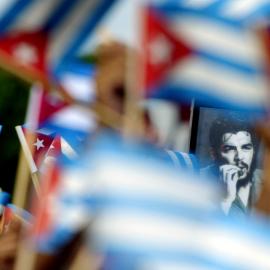To the Editor:
Theresa Bond's article ("The Crackdown in Cuba," September/October 2003) lacks a serious consideration of whether diplomacy -- rather than revanchism -- should be Washington's weapon of choice in moderating Fidel Castro's authoritarian regime and ameliorating volatile U.S.-Cuba relations.
Bond neglects to note that Cuba remains the exception in an otherwise cheerfully pragmatic U.S. human rights policy. The Bush administration has used diplomacy fruitfully around the world to engage countries, such as Syria and North Korea, whose deplorable human rights records make Castro's transgressions appear diminutive. The White House's relentless policy toward Cuba -- marked by bellicose rhetoric and a constant shifting of the goal posts that Cuba must pass between to qualify for bilateral "engagement" -- has been driven primarily by the desire to placate Miami's influential Cuban-American community.
Bond's suggestion that Castro orchestrated last spring's crackdown in order to derail a possible bilateral rapprochement with the United States is far-fetched. She acknowledges that James Cason (head of the U.S. interests section in Havana) had been meeting openly with dissidents and supplying them with materiel in the months before the arrests -- presumably acting on State Department instructions to lure Castro into overreacting and thus to further discredit his regime. When a diplomatic representative from a country with a history of aggression engages in such activities, it is hardly surprising that serious consequences follow.
LARRY BIRNS
JESSICA LEIGHT
Council on Hemispheric Relations
